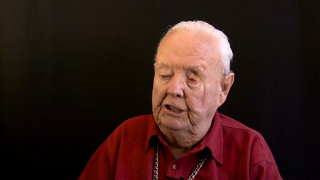5:47 | They were called the Hollywood Commandos. They did discover a beached two man Japanese submarine, but most of the time they were hanging out with movie stars at the Hollywood Canteen. Ken Faulkner recalls his duty early in the war in Southern California and he tells how an unkempt, disinterested soldier won the respect of a visiting General.
Keywords : Ken Faulkner Japanese submarine (sub) Hollywood Commandos Hollywood Canteen movie star Kay Kyser big band Hedy Lamarr Irene Dunne Fred MacMurray Dinah Shore Robert Stack VK Anderson Harvey Carlson chess

Out of Kansas came Ken Faulkner, drafted into the Army and sent to the Louisiana Maneuvers after his basic training. He had a deathly fear of snakes and that was troublesome in the swamps of the bayou. Some of the men procured hammocks to get them up off the ground at night and this allowed him to get a good night's sleep. Then came some astounding news from Pearl Harbor.
Ken Faulkner reveals why he never drew any salary in the Army and why he never got a promotion from within his company. After Pearl Harbor, his unit was assigned guard duty at West coast facilities and he received his Corporal stripes despite cussing out the First Sergeant.
The war was on but his unit kept training. Sent from comfortable California to blazing hot Alabama, Ken Faulkner was busted to private for filling his canteen in a stream. This would not be the first time he lost his stripes and he always got them back because he was an excellent platoon Sergeant. From the sweltering heat of the Summer maneuvers, he next endured frigid Winter cold in the Tennessee mountains, where he continued his tendency to buck the system.
At his last training stop before going overseas, Ken Faulkner had his platoon practice a training exercise and placed marks on the ground for them to use during a demonstration in front of Harry Truman. After that triumph, he faced a rough Atlantic crossing and his research on seasickness proved only partially successful.
SGT Ken Faulkner's unit arrived in England and were immediately billeted in nice beach homes in Wales. D-Day came and went, so they figured they would be the first wave of relief. He got a new Lieutenant and was criticizing him one day, as platoon Sergeants will, when another officer took exception and he lost his stripes again. But his new platoon leader got revenge.
It was an awful thing to see on the way to your first combat. The bodies were stacked like lumber on Omaha Beach as Ken Faulkner moved inland. He remembers that no one knew what they were doing as they advanced on their first German position in hedgerow country, but he got his bearings quickly and his platoon rallied successfully.
SGT Ken Faulkner never asked anyone else to lead. It was, "Follow me," and they always did. In hedgerow country, the Germans made him mad when they shot up his cigars, then they sent him to a hospital in England with an 88mm gun, "the best weapon in the war on either team." He returned to lead his platoon as they pushed across France.
He was the best soldier the company ever had. Ken Faulkner tells the story of 2LT Victor Schultz, who received a battlefield commission and died heroically. His closest buddy also died after surviving a battlefield wound and getting shipped home for his surgery.
You can tell green replacements what to do, but you can only hope they will do it. SGT Ken Faulkner remembers some who did not. Trying to help one of them got him a a second shrapnel wound. When he returned to the front, he was given the weapons platoon and warned some of those men might run away under fire. Faulkner was just the leader to handle that.
The day after a sniper killed the man next to him and shot a hole through his jacket, Ken Faulkner got the joyous news that he was selected for a furlough to the States. During his time home, he visited many of the families of his dead comrades and told every one of them that their loved one did not suffer. That made him a big liar. When he got back to the front, he turned down a battlefield commission and faced a platoon full of new faces.
After pushing across France and Germany without a Lieutenant to lead his platoon, SGT Ken Faulkner finally got one. A West Point man, no less. Then came the first enemy fire.
From the beginning, their objective was the Elbe River and now they'd reached it. For Ken Faulkner's platoon, there was one nerve wracking job left, a midnight reconnaissance patrol across the river. He was sure he was going to be the last casualty of the war.
Ken Faulkner tells the tale of Dick Julian, "the killingest man we got." They had to quit giving him prisoners to escort to the rear. Two minutes later, you would hear the shots. Over and over, Julian earned his reputation, but it was time for a bit of irony after the war.
After the war ended in Europe, SGT Ken Faulkner befriended a young Mexican soldier and helped him out of a jam. Before he shipped out for home, his platoon was scheduled for a close order drill demonstration but his time was up and it was cancelled. He had already performed for President Truman, anyway.